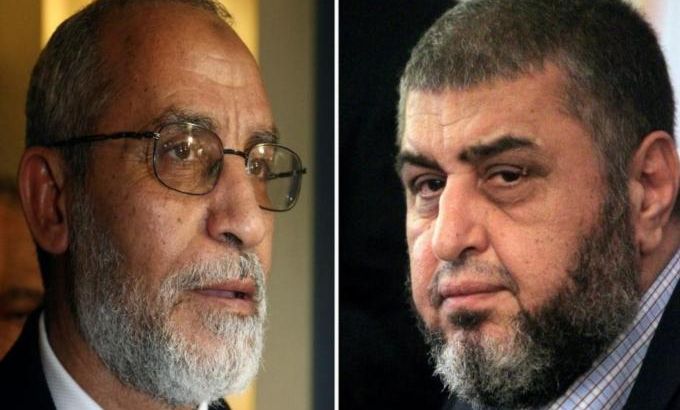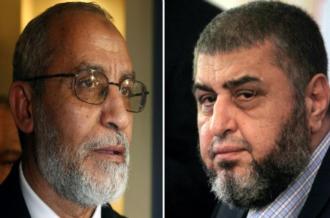Egypt army cracks down on Muslim Brotherhood
Leadership of toppled president Morsi’s Islamist movement arrested, as top judge takes office as interim leader.

Egypt’s army has rounded up the leadership of the Muslim Brotherhood as a top judge took oath of office as the country’s interim leader, a day after the military chief toppled President Mohamed Morsi from power.
The army turned the screws on the Brotherhood on Thursday, with military police arresting the group’s supreme leader Mohamed Badie “for inciting the killing of protesters”, as Brotherhood supporters protested the abrupt end of Morsi’s one year rule.
He, and his powerful deputy, Khairat el-Shater, were wanted for questioning on their role in the killing this week of eight demonstrators in clashes outside the Brotherhood’s Cairo headquarters.
The military chief General Abdel Fattah al-Sisi on Wednesday announced the removal of Morsi after days of nationwide protests by opposition groups calling for the Islamist president’s ouster.
A judicial source said the prosecution would on Monday begin questioning members of the group, including Morsi, for “insulting the judiciary” as the charges begin to pile up.
Other Brotherhood leaders would be questioned on the same charges, including the head of the group’s political arm Saad al-Katatni, Mohammed al-Beltagui, Gamal Gibril and Taher Abdel Mohsen.
Morsi and other senior leaders have also been banned from travel pending investigation into their involvement in a prison break in 2011.
The deposed president himself has been held in an unknown location since the generals pushed him out.
‘Friday of Rejection’
An Islamist coalition led by the Muslim Brotherhood appealed to Egyptians on Thursday to demonstrate across the nation in a “Friday of Rejection” against the military coup.
The National Coalition in Support of Legitimacy “calls on the Egyptian people to take to the streets and mobilise
peacefully” after Friday prayers “to say ‘No’ to military detentions, ‘No’ to the military coup”.
The call was issued at a news conference at a mosque in suburban Cairo where Morsi supporters have staged a sit-in since last week.
Speaking to Al Jazeera from Cairo, Gehad El Haddad, a spokesman for the Muslim Brotherhood, said that numerous members of the Islamist movement were missing.
“The army has arrested the president; they put him under house arrest. They arrested the entire presidential team and issued arrest warrants with no court or trials,” El Haddad said.
“[…] This is a military coup by all accounts… this is a police state back in action,” he added.
The army also shut down several TV stations, including one operated by the Muslim Brotherhood, and the offices of Al Jazeera’s Egyptian news channel in Cairo.
Interim president
The announcement of the arrests on Thursday came as chief justice Adly Mansour, 67, was sworn in as interim president at a ceremony broadcast live from the Supreme Constitutional Court.
On Wednesday evening, the military chief announced that the new interim president will serve until elections at a yet-to-be determined date, as he laid out a roadmap for a political transition that includes a freeze on the Islamist-drafted constitution.
Dressed in a dark blue suit and a sky blue tie, Mansour used his first remarks as interim leader to praise the massive street demonstrations that led to Morsi’s ouster.
He hailed the youth behind the protests that began on June 30 and brought out millions around the country.
 |
| Muslim Brotherhood’s supreme leader Mohamed Badie (left) and his deputy, Khairat el-Shater |
June 30 “corrected the path of the glorious revolution that took place on Jan. 25,” he said, referring to the revolt against autocrat Hosni Mubarak that began January 25, 2011 and led to his ouster 18 days later.
That fact that Mansour comes from the Constitutional Court adds a symbolic sting to Morsi’s ouster.
The Islamist leader and his Muslim Brotherhood backers had repeatedly clashed with the judiciary, particularly the constitutional court, while in power, accusing the judges of being loyalists of former autocrat Hosni Mubarak, who was ousted in a 2011 uprising, and saying they seek to undermine Egypt’s shift to democratic rule.
The judges, meanwhile, had repeatedly challenged the Brotherhood’s policies and what many in Egypt considered the group’s march to power.
The Constitutional Court dissolved the Islamist-dominated parliament in June last year, saying it was illegally elected. It rejected a Morsi decree to reinstate the chamber.
The Brotherhood announced it would boycott the new military-sponsored political process and called on its supporter to restrain themselves and not use violence.